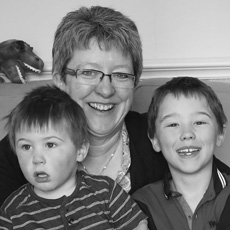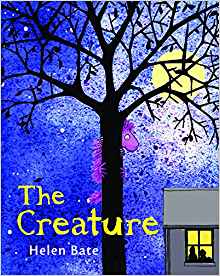Helen Bate is the author and illustrator of the new children's graphic novel Peter in Peril: Courage and Hope in World War II. It tells the story of a Jewish boy in Hungary during the war. She has illustrated six children's books. She lives in Shropshire, England.
Q: How did you learn of Peter's story, and how did you
decide on the graphic novel format in which you told it?
A: Peter is my brother-in-law. He’s been married to my
sister for 40 years and they have always lived in Switzerland and Austria.
Ever since I found out what had happened to Peter I have
felt it important to write it down in a way that children could understand, and
the graphic novel format seemed the real way to do that.
I decided to include much more text than you’d find in traditional
graphic novels, as I wanted parents or teachers to be able to read the story to
a child - it’s a difficult subject and one that needs some adult involvement to
answer any questions it raises.
Q: What kind of research did you need to do to write the
book, and was there anything that particularly surprised you?
A: I had my brother-in-law’s story written down in detail by
my sister - so that saved me a lot of research. I did, however, have to go back
to Peter for certain details or more information to fill in the gaps.
I also needed to simplify parts of the story - as there was
actually more complexity in reality, than appears in the story. I did this in
full consultation with Peter as I didn’t want him to be unhappy with the
finished version.
When I was watching some film footage of the events of the Holocaust,
I was very surprised by how the people who were liberated from the
concentration camps at the end of the war, so quickly tried to get back to
normal life - even while still living in the camps.
Clothes were brought in, and the women immediately started
to take care in their appearance. The urge to get back to a normal, civilised
life was strong - despite the terrible horrors they had experienced and
witnessed. They weren’t completely broken.
Q: What do Peter and his family think of the book?
A: Peter and his family are very happy with the book.
They’re also happy that Peter’s cousin Eva, who also appears in the book, had
the chance to see it in print before she died.
Peter's eldest grandchild who lives in Scotland, is a bit
young for the book still, but she was recently read the story and was
fascinated that this little boy was her Grandad. As Peter’s grandchildren grow
up, it will be a lasting reminder for them of their own family history.
The book's also been well received by Peter’s brother and
his family who still live in Budapest. Their history has never been talked
about much and the younger family members are really very interested in it.
Q: What do you hope young readers take away from Peter's
story?
A: I hope young readers take away the message that although
awful things can happen, life does go on and people can recover.
I wanted young readers to know that children like them can
survive these things, and go on to have a good life - especially readers that
have been through the modern day atrocities happening in the world right now.
I also wanted them to see that although there are evil
people in the world, there are also good people… and they can choose which they
want to be.
Q: What are you working on now?
A: I am working on a second graphic novel style story about
dementia. This is an area I’ve worked in for 10 years after my own mother had
dementia. (I set up the social enterprise www.picturestoshare.co.uk to
publish books for people with dementia.)
Although there are quite a few simple picture books for younger
children on a theme of “My Grandma has dementia” there is nothing in a bit more
depth for older children about 7 to 10.
I wanted to provide a book about dementia that is both funny
and positive - and I was inspired by a wonderful book written by Martin Slevin
about his mother and her dementia - The Little Girl in the Radiator.
Q: Anything else we should know?
A: I have a children’s picture book coming out in October in
the U.K. called The Creature. This book stems from my interest in the way animals are
portrayed in children’s books and how any portrayal of the REAL nature of
animals and “wildness” is almost non-existent.
Animals are relentlessly anthropomorphised in books and
films for young children because it’s easy to make them funny, “cute,” and
appealing.
But there are very few books or films that encourage our
children to really feel the magic, mystery and ‘otherness’ of the wild
creatures that live alongside us. I wanted to try and do this.
--Interview with Deborah Kalb



Could you ask Helen if she edited the letters by Douglas Dutton?
ReplyDeleteCould you ask Helen if she edited the letters by Douglas Dutton?
ReplyDelete